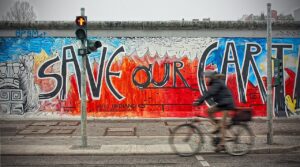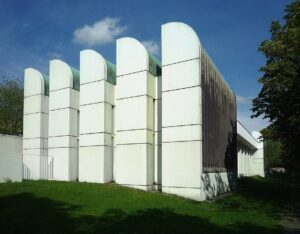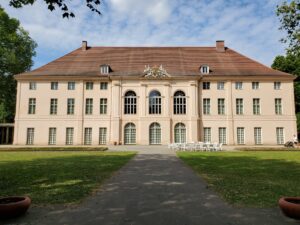From Power to Tranquility: Walking Through the DDR Leaders’ Enclave in Berlin
When you visit Berlin, especially if it’s your first visit, you’ll naturally gravitate to the big sites. The Brandenburg Gate, the Reichstag and the Museum Island are all must-sees. But if you really want to get a glimpse of the real Berlin, the city beyond the headlines and get to grips with the raw human stories the German capital has to tell, then you simply have to get away the beaten track and wander off to those places that aren’t on the package tour itinerary.

Berlin’s Hidden DDR History
The lost world of the German Democratic Republic, or the DDR to give it its abbreviated name in German, is one of those eras that’s worth diving into. Berlin, as the capital of the long-deceased communist state, occupies an exceptional place on the modern European map. East Berlin was the capital of a state which was the product of a unique moment in history, namely the Cold War. That state came into existence as a result of that bitter rivalry between the superpowers, with the fall of its «Anti-Fascist Protection Barrier» in November of 1989 heralding the conflict’s end. East Berlin was born and then died as a result of world politics, mostly happening elsewhere.
Unique Legacy of East Berlin – Capital of East Berlin and the Cold War Period
I can’t readily think of another place in Europe that has that distinction. Sure, political systems come and go, and borders were changed many times in the last century and a half, but East Berlin and the state it ruled over must surely be unique in the extent to which they depended on and were created by external forces. Today that state is gone and although lamented by few, its memory extends throughout modern Berlin.
These days you might have to look hard for its essential nature. Of course, you can see the iconic East German TV tower from anywhere in the city, but its significance as a statement about the upward progress of Communism has been lost. Today, it’s a shorthand for «we’re in Berlin» when TV shows make their establishing shots. You can visit the various Wall memorials and remnants, but although some concrete remains, the spirit of the Wall, its atmosphere of fear, menace and division has long vanished.
A Walk Through the Majakowskiring: The DDR’s Power Center
So if you want to get a taste of what DDR life was like, what the essence of that most astonishing of artificial states consisted of, you have to get away from the city centre and head to the once secluded corner of the city where the leadership once called home.
This formerly heavily guarded and restricted area was called the «Majakowskiring,» after the famous Soviet poet Vladimir Mayakovsky. Located in the district of Pankow, about a 20-minute walk from the Pankow U-Bahn station, the Ring was exactly that – an oval shaped street with only a couple of restricted access points allowed entry. Before the coming of the communist state, this once remote suburb was occupied by minor industrialists and people we’d probably call upper middle class. Around this one-kilometer length oval, they built detached houses for themselves, away from the smog and industry of the city.
From Elite Residences to Haunting Silence
After the war, given the extreme shortage of undamaged buildings, the Soviet military took over the unscathed Ring and used it for their own purposes. With the creation of the DDR in 1949, the houses of the former capitalist upper middle class nouveaux riches found themselves becoming the homes of the great and the powerful in the DDR.
Today, strolling around the formerly secluded power center of the Soviet’s most important Cold War client state is a strangely haunting experience. The communists have long since died or moved away, and today the area is again an affluent area. Yet the old ghosts remain. On the morning I was there, the streets were deserted, with my footfalls the only sound to be heard among the tweeting of birds and the very occasional dog bark. In the hour I spent walking, I crossed paths with fewer than half a dozen fellow walkers. All were locals, out for a morning stroll.
Preserving the Past: The DDR Leaders’ Homes Today
The houses of the elite have, for the most part, remained as they once were. Little renovation work has been done. The biggest change is also the most interesting. Walter Ulrich’s home was destroyed after his departure from power, in a gesture to erase his memory and hence his influence in power politics in the 1970s. A new building stands in its place today.
Otherwise, you can still see the houses occupied by the former president of the DDR and his Prime Minister. To get the most from your visit, download from any number of sites the list of addresses and who lived where. You’ll get a pretty good cross-section of life in the land where all were equal, but some were more equal than others.
Touching the Essence of DDR Life
The impression you get here is what lasts. Apart from the lack of security and the attendant implied fear, the only big change from the former days is the presence of modern cars parked curbside. Far more than any place in the city centre, it’s here that you’ll be able to touch the essence of that most famous «created state» in modern European history. Here you’ll be able to sense, even if at a distance, the fears and the promises, the political backstabbing and the earnestness of the so-called «Men from Pankow» who did some much to shape European history in the post war years.
The End of an Era: The DDR Leaders’ Final Days
The Majakowskiring remained the place of residence for the DDR leaders until 1960, after which most of them decamped to an even more remote location outside Berlin entirely. What scared them off was the power of the people in whose name they claimed to govern. The 1953 Berlin uprising and the revolt in Budapest against the Communist authorities there finally put the wind up the DDR leadership and they eventually decamped to a settlement in a remote forest, which incidentally is also open to visit today. I’ll cover that location in an upcoming article.
A Journey Through History: Visiting Berlin’s DDR Enclave
When you plan your trip to Berlin, and if you have the slightest interest in touching the Cold War past to get a glimpse of how the elite lived, then head out in the early morning stillness and take yourself to the compound of the leaders, and fear the last remnants of the fear and the power that once haunted these quite roads.
Majakowskiring is located in the Pankow district of Berlin,
specifically in the Niederschönhausen locality.
The address is:
Rudolf-Ditzen-Weg 2,
13156 Berlin.
Public Transport Options
To get to Majakowskiring, you can use the following public transport options:
- Bus: Lines 150, 155, 250, and M27 stop near Majakowskiring.
- Subway (U-Bahn): The U2 line serves the nearby stations.
- Train (S-Bahn): Lines S1, S2, and S8 also provide access to the area.



